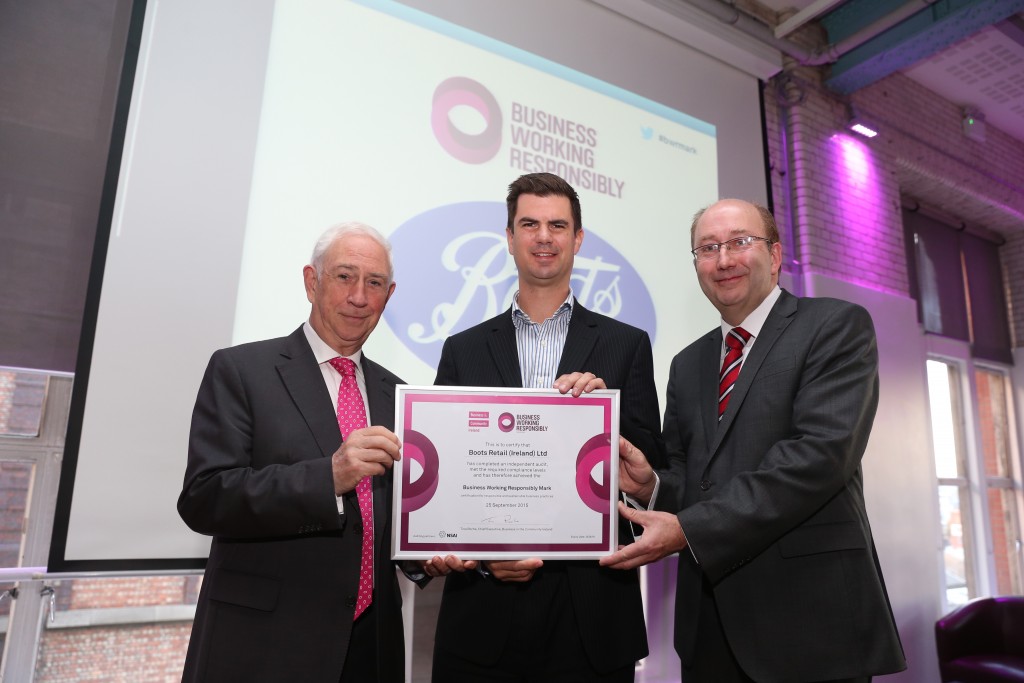Good corporate citizenship runs deep at Boots

Pictured : BITCI Chairman Kieran McGowan with Richard Bradley CEO Boots and Maurice Buckley NSAI CEO
In a ‘mission statement’ drafted before the term was even coined, its founding family made a pledge: “We declare – for pure drugs, for qualified assistants, for first class shops, for reasonable prices, for your good health and for moderate profits” to “minister to the comfort of the community in a hundred ways”. That was in 1897.
More than a century later the chain still sees good corporate citizenship as central to business success.
Two years ago Boots Ireland, which has 74 stores and employs in excess of 2000 staff, appointed a full time Corporate and Social Responsibility (CSR) manager, Stephen Looney, a HR graduate and previously manager of the company’s flagship store in Dublin’s St Stephen’s Green Shopping Centre.
For Looney, one of the most obvious benefits of having a strong CSR ethic is the employee engagement it fosters.
“We all have to get up and go to work somewhere, having a strong CSR culture gives you the why, as in, why Boots. It’s why we have such high staff retention rates,” he said.
Through fund raising activities such as its Night Walk and its participation the Shave or Dye campaign, it has raised hundreds of thousands of euro for cancer support, as well as run awareness campaigns.
All these initiatives have obvious community benefits but what companies not engaged in CSR may not appreciate are the employee benefits that accrue.
“We know from feedback that our employees are blown away that Boots has invested in this, that it is enabling them to help others, and that good will runs through all our stores.”
‘Feel good’ is, after all, Boots motto, one addressed to all its stakeholders.
“We don’t do it for marketing purposes, although there are those positive aspects to it, but because it’s the right thing to do. Put it this way, we could just give a percentage of our profits in a cheque. It’s not about that so much as actively helping, about making a difference. It takes a lot more work to approach CSR this way, but it’s worth it.”
Achieving the Business Working Responsibly Mark from Business in the Community two years ago played a key role in formalising the company’s CSR activities.
“I knew we were doing a lot of good stuff but I didn’t have a benchmark from which to develop a strategy.”
He is conscious that CSR can easily be dismissed as something nice to have, but not necessary to business success.
“To make this agenda real you need to put resources into it. Invest in CSR and you’ll get the pay back,” said Looney.
Boots Ireland managing director Richard Bradley agrees.
“As a business that is 160 years old, and which wants to succeed for another 160 years, we see it as our responsibility to ensure that the impact we have as a business is a positive one,” said Bradley.
“CSR is intrinsic to everything we do, whether it’s sourcing our products, or testing them, through to dealing with customers. After all, every product on our shelves is a representation of our brand – so its environmental impact and its ethical impact, right the way through the supply chain, matters to us.”
Getting the Mark was, for Bradley, a way of verifying just how strong it was on this front, from an independent assessor.
“It’s too easy to give yourself a pat on the back. The appeal of the Business Working Responsibly Mark was that it was hard to get, which made it a challenge. We simply would not have been interested if it were a rubber stamp you could buy.”
Part of the value of it was that it forced the organisation to focus on areas it had a policy on, but didn’t measure.
“The biggest challenge was pulling all the data together. From a leadership perspective it is about ensuring everything we do on this front is aligned with our overall strategy. Anything we do under the CSR banner links in some way back to health and beauty.”
Putting a monetary value on CSR remains a challenge. “It’s really hard to define the business benefits of CSR to be honest,” he said.
“But what I do know is that to have a successful business, I need the most engaged colleagues possible. The happiest colleagues provide the best care to customers, and that feeds out into the community. People feeling they have a purpose beyond profit is hugely important,” said Bradley.
In the marketplace too, the benefits are evident, if not always immediately measurable.
“We have a brand that people trust. When we launch a product, people assume it will work. When we give advice, people assume it is impartial. That is central to our business success. All I know is that the most successful companies in the world have an integrated CSR policy, and I’m not prepared to risk my own business’s success to test that theory.”
